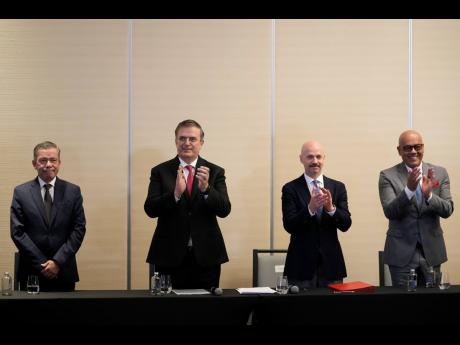Editorial | Bring out the WD40 for Venezuela relations
Published:Monday | November 28, 2022 | 11:51 AM
Saturday’s decision by the Biden administration to allow the American company, Chevron, to resume limited oil production in Venezuela, and the agreement between Nicolás Maduro’s government and the opposition to unfreeze billions of dollars for humanitarian spending, opens an opportunity for Jamaica to begin mending its own relations with Caracas.
In the first place, Jamaica should not want to be the straggler, appearing to be still nursing grudges, when the real protagonists have settled, or are on their way to settling, their dispute. It is in Jamaica’s interest to be on the ground floor of any American rehabilitation of Venezuela which would, in time, see Venezuelan oil freely return to the global market. Despite America’s protestations to the contrary, oil, or the current volatility in the market for the commodity, has everything to do with Washington’s mild easing of sanctions against Venezuela.
Jamaica-Venezuela relationship has been largely frozen since 2019, when Kingston closed its embassy in Caracas in the midst of a deepening row over Jamaica’s endorsement of Juan Guaidó as Venezuela’s legitimate president and its nationalisation of Venezuela’s 49 per cent of the 35,000 bpd Petrojam oil refinery.
The Biden administration’s search for a new strategy (which has included direct talks between the two sides and an exchange of prisoners) for dealing with Venezuela intensified after Russia’s February invasion of Ukraine, and sanctions imposed against Moscow caused oil prices to spiral, jacking up prices at the pumps in America. It is hardly a secret that the US wished that Venezuela’s oil spigots were open. It, nonetheless, believes that political concessions must be extracted from the Maduro government for that to happen.
Mr Maduro, on the other hand, has an incentive to try for a deal. Caracas needs foreign investment to resuscitate its sanction-battered oil infrastructure, and earnings from oil to help revive its economy that is struggling along. Indeed, up to seven million Venezuelans have left the country because of its political and economic crisis.
RESUME UPKEEP
In line with their embryonic detente, the United States earlier this year allowed Chevron and other US oil companies to resume the upkeep of oil wells they operate in partnership with Petróleos de Venezuela, SA (PDVSA). And on Saturday, the Treasury Department announced that Chevron would be allowed a limited resumption of oil production, with the condition that it would not return profits from exports to PDVSA or pay taxes or royalties to the government. Instead, the profits would be directed to writing down debt owed by PDVSA to Chevron.
Meanwhile, at political talks between the government and the opposition in Mexico, they agreed that US$3 billion in Venezuelan money frozen abroad would be transferred to a United Nations-administered fund, to be used for humanitarian relief in Venezuela.
These agreements required concessions from all sides and broke the stalemate in Venezuela’s political crisis. Yet, the slight gains can be derailed. It could, however, lead to further breakthroughs, including, in the case of energy, the US, in the near term, removing roadblocks to third-country oil companies operating in Venezuela.
It will, however, probably require years for Venezuela’s oil industry to recover. Nonetheless, Joe Biden, the American president, is acting with political pragmatism. Juan Guaidó has not been fully thrown under the bus. The Americans insist that their aim is to ensure a return to ‘democracy’ in Venezuela, and say that they have many levers to pull should Mr Maduro does not genuinely pursue reforms, leading to ‘genuine’ elections.
But Mr Biden’s motivation is being driven by oil, the high prices Americans have paid for gasolene at the pumps and how this became a symbol of the highest rates of inflation the US has endured in decades. The bottom line, it is primarily about America’s interest.
GOOD RELATIONS
In Jamaica’s case, having good relations with Venezuela is of itself sensible. In any event, the Janus-faced policy that Jamaica has attempted to maintain over Mr Guaidó – he is president, but not the head of government – is untenable, a mockery of international law, and likely to drive to insanity anyone attempting to enforce it.
From the standpoint of economic pragmatism, if Venezuela’s oil wells are rejuvenated it will have petroleum to sell. It is unlikely that Venezuela would return to a full-blown PetroCaribe-style arrangement, or that Jamaica, with Mr Maduro in charge, will be a preferred beneficiary of concessionary payments for oil imports. But the Venezuelans, too, as their engagement with America shows, have to be pragmatic. They will want to do business with Jamaica and be able to operate within a wider diplomatic sphere. Prime Minister Andrew Holness should advise his foreign policy team to begin working at it.
It might be early to rehang the shingles at the embassy in Caracas. But it should be taken out of storage and locks checked to ensure they have not seized up. Put another way, Kamina Johnson Smith, the foreign minister, should begin applying the WD40 of international relations to Venezuela.

